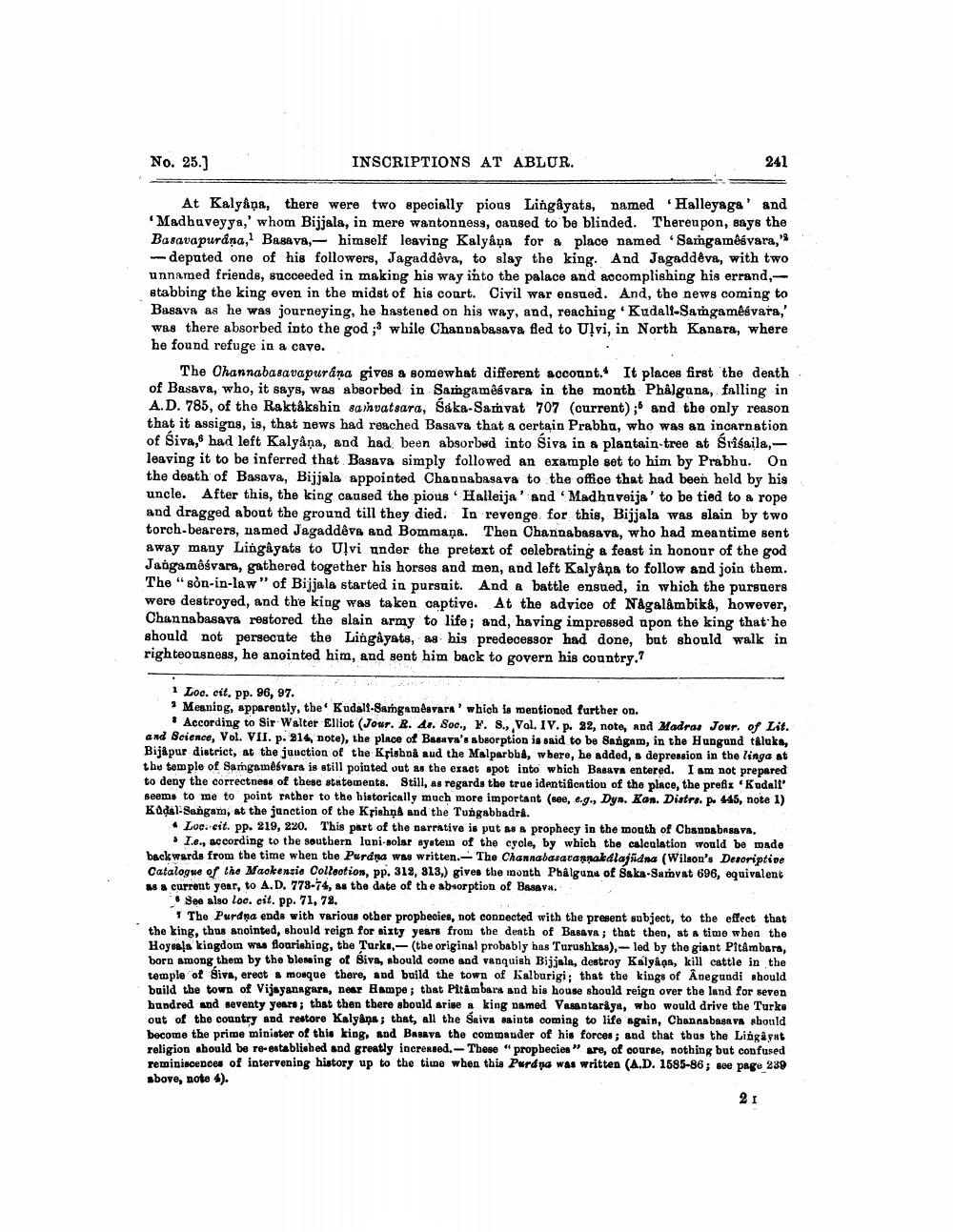________________
No. 25.)
INSCRIPTIONS AT ABLUR.
241
At Kalyana, there were two specially pious Lingayats, named Halleyaga' and Madhuveyya,' whom Bijjala, in mere wantonness, caused to be blinded. Thereupon, says the Basavapurana, Basava,- himself leaving Kalyaņa for a place named 'Samgamêsvara," -deputed one of his followers, Jagaddôva, to slay the king. And Jagaddeva, with two unnamed friends, succeeded in making his way into the palace and accomplishing his errand, - stabbing the king even in the midst of his court. Civil war ensued. And, the news coming to Basava as he was journeying, he hastened on his way, and, reaching Kudall-Sangamêsvara, was there absorbed into the god ;3 wbile Chanda basava fled to Uļvi, in North Kanara, where he found refuge in a cave.
The Ohannabasavapurana gives & somewhat different account. It places first the death of Basava, who, it says, was absorbed in Samgamêśvara in the month Phâlguna, falling in A.D. 785, of the Raktákshin samvatsara, Saka-Samvat 707 (current) ;' and the only reason that it assigns, is, that news had reached Basave that a certain Prabha, who was an incarnation of Siva, had left Kalyana, and had been absorbed into Siva in a plantain-tree at Srisaila, leaving it to be inferred that Basava simply followed an example set to him by Prabhu. On the death of Basava, Bijjala appointed Chaonabasava to the office that had been held by his uncle. After this, the king caused the pious Halleija' and 'Madhuveija' to be tied to a rope and dragged about the ground till they died. In revenge for this, Bijjala was slain by two torch-bearers, named Jagaddêve and Bommaņa. Then Channabasava, who had meantime sent away many Lingayats to Ulvi under the pretext of celebrating a feast in honour of the god Jangamsvara, gathered together his horses and men, and left Kalyana to follow and join them. The "son-in-law of Bijjala started in pursuit. And a battle ensued, in which the pursuers were destroyed, and the king was taken captive. At the advice of Nagalambika, however, Channabasava restored the slain army to life; and, having impressed upon the king that he should not persecute the Lingayats, as his predecessor had done, but should walk in righteousness, he anointed him, and sent him back to govern his country.?
1 Loc. cit. pp. 96, 97. • Meaning, apparently, the Kudall-Samgamêsvars' which is mentioned further on.
. According to Sir Walter Elliot (Jour. R. 41. Soc., F. S., Vol. IV. p. 22, note, and Madras Jour. of Lit. and Science, Vol. VII. p. 914, note), the place of Basuva's absorption is said to be Sangam, in the Hungand talaka, Bijapur district, at the junction of the Krishna sud the Malparbba, where, he added, a depression in the linga at the temple of Samgamesvara is still pointed out as the exact spot into wbich BASAYA entered. I am not prepared to deny the correctness of these statements. Still, as regards the true identifientiou of the place, the prefix Kudall' seems to me to point rather to the bistorically much more important (see, e.g., Dyn. Kon. Distri. p 145, note 1) Kudel-Sangam, at the junction of the Krishņi and the Tungabhadra.
Loe. cit. pp. 219, 220. This part of the Barrative is put as prophecy in the mouth of Chandanava.
Le, according to the soutbern luni-solar systein of the cycle, by which the calculation would be made backwards from the time when the Purdna was written - The Channabasarannakdlajsidna (Wilson's Desoriptive Catalogue of the Maokentia Collation, pp. 318, 313,) gives the month Phalguna of Saka-Sunyat 696, equivalent M & current your, to A.D. 778-74, as the date of the absorption of Basava.
See also loc. cit. pp. 71, 72.
1 The Purdna ends with various other prophecies, not connected with the present subject, to the effect that the king, thus anointed, should reign for sixty years from the death of Balava; that then, at a time when the Hoysala kingdom ww flourishing, the Turks-(the original probably bas Turushkas),-led by the giant Pitambara, born among them by the bloning of Biva, should come and vanquish Bijjala, destroy Kálykos, kill cattle in the temple of Siva, erect & mosque there, and build the town of Kalburigi; that the kings of Anegundi should build the town of Vijayanagara, near Hampe, that Pitambara and his house should reign over the land for seven hundred and seventy years; that then there should arise a king named Vasantaraya, who would drive the Turks out of the country and restore Kalyan ; that, all the Saiva saints coming to life again, Channabasavs should become the prime minister of this king, sod Basava the commander of his forces; and that thus the Lingayat religion should be re-established and greatly increased. - These "propbecies" are, of course, nothing but confused reminiscences of intervening history up to the time when this Purdna was written (A.D. 1585-86; soe page 239 above, note 4).
21




